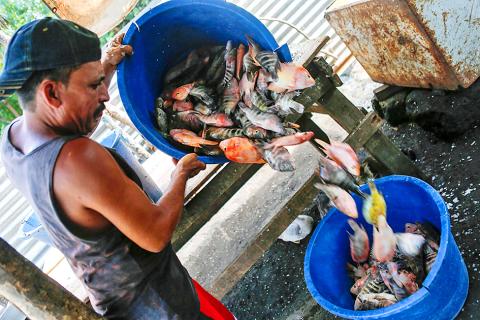Looking tired and haggard, William Coronado pulls up before dawn with a boat full of fish on the muddy shore of Nicaragua’s Lake Managua, a dumping ground for trash and waste.
“The lake is so polluted. They throw all sorts of crap into it,” the 56-year-old said. “Containers, old buckets, all sorts of bags — all the junk they throw away in Managua. It’s a disgrace.”
Coronado spent two days under the Central American sun and windy nights to bring in a haul of hundreds of tiny two-banded sea bream and other freshwater fish, to sell them for US$1.30 per dozen to a business just north of the capital, Managua.

Photo: AFP
His wife, Rosa, waits for him in a rickety house built of tin and plastic located just 300m from the lake, living in extreme poverty like most of the neighbors.
Lake Managua, also known as Lake Xolotlan, is one of the biggest freshwater bodies in Central America. It is also one of the most polluted, a problem that started nearly a century ago.
Between 1967 and 1992, a US chemical company, Pennwalt, regularly dumped mercury into its depths.
From 1927 to 2009, the capital, which sits on the lake, tipped its untreated sewage and factory outflows into the lake.
Eight years ago, the government finally opened a treatment plant financed by German funding and the Inter-American Development Bank. Since then, the pollution has eased, the bad odors have lessened and the lake has become a tourist attraction.
However, the former head of the state water company, Ruth Herrera, said that it could take another 100 years before the expanse of water is finally clean — maybe longer, if residents continue to tip their garbage into it.
Health authorities in the country are still warning pregnant women to avoid eating fish caught in the lake to prevent their babies developing disorders such as mental retardation or stunted growth due to the high mercury levels.
A study carried out last year by the Autonomous University of Nicaragua, with backing from Japan, found that the guapote freshwater fish from Lake Nicaragua had 0.46 micrograms of mercury per kilo, above the authorized level of 0.40.
Other species of fish had lower levels, and most of the lake has trace levels of mercury.
“Maybe these fish have low levels, but over the long term, the population could have health effects if it eats them,” said Jurguen Guevara of Centro Humboldt, an environmental group.
Herrera also advised against eating fish from the lake, although she suggested that the estimated 100,000 mostly poor people living around its shores might have developed some sort of resistance to illnesses by eating the fish.
“We eat fish from there every day and nothing has happened to us,” said Ofelia Ramirez, from a village called Tipitapa.
However, the locals have little choice: they are among the one-third of Nicaragua’s population living under the poverty line, and the lake represents their only source of work and sustenance.
Dozens of fishermen can be seen sailing in the middle of the night in small boats made of fiberglass or wood, pulling up nets cast in the lake.
“We bring back about 20 dozen” fish every day, said Juan Ramirez, a 30-year-old setting off in a canoe with his two children to help him fish the lake’s waters.

VAGUE: The criteria of the amnesty remain unclear, but it would cover political violence from 1999 to today, and those convicted of murder or drug trafficking would not qualify Venezuelan Acting President Delcy Rodriguez on Friday announced an amnesty bill that could lead to the release of hundreds of prisoners, including opposition leaders, journalists and human rights activists detained for political reasons. The measure had long been sought by the US-backed opposition. It is the latest concession Rodriguez has made since taking the reins of the country on Jan. 3 after the brazen seizure of then-Venezuelan president Nicolas Maduro. Rodriguez told a gathering of justices, magistrates, ministers, military brass and other government leaders that the ruling party-controlled Venezuelan National Assembly would take up the bill with urgency. Rodriguez also announced the shutdown

Civil society leaders and members of a left-wing coalition yesterday filed impeachment complaints against Philippine Vice President Sara Duterte, restarting a process sidelined by the Supreme Court last year. Both cases accuse Duterte of misusing public funds during her term as education secretary, while one revives allegations that she threatened to assassinate former ally Philippine President Ferdinand Marcos Jr. The filings come on the same day that a committee in the House of Representatives was to begin hearings into impeachment complaints against Marcos, accused of corruption tied to a spiraling scandal over bogus flood control projects. Under the constitution, an impeachment by the

Exiled Tibetans began a unique global election yesterday for a government representing a homeland many have never seen, as part of a democratic exercise voters say carries great weight. From red-robed Buddhist monks in the snowy Himalayas, to political exiles in megacities across South Asia, to refugees in Australia, Europe and North America, voting takes place in 27 countries — but not China. “Elections ... show that the struggle for Tibet’s freedom and independence continues from generation to generation,” said candidate Gyaltsen Chokye, 33, who is based in the Indian hill-town of Dharamsala, headquarters of the government-in-exile, the Central Tibetan Administration (CTA). It

A Virginia man having an affair with the family’s Brazilian au pair on Monday was found guilty of murdering his wife and another man that prosecutors say was lured to the house as a fall guy. Brendan Banfield, a former Internal Revenue Service law enforcement officer, told police he came across Joseph Ryan attacking his wife, Christine Banfield, with a knife on the morning of Feb. 24, 2023. He shot Ryan and then Juliana Magalhaes, the au pair, shot him, too, but officials argued in court that the story was too good to be true, telling jurors that Brendan Banfield set